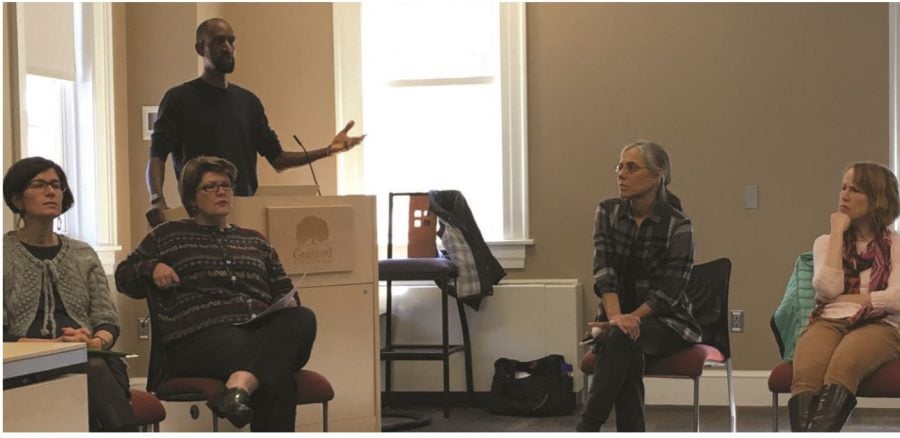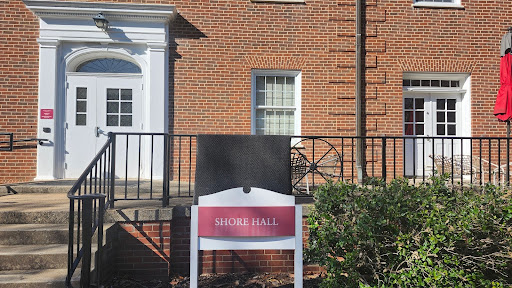Trump talks teach community about policy, action
Associate Professor of Philosophy Vance Ricks ’92 talks about digital government surveillance during the Trump teach-in.
On Feb. 15, Guilford College hosted the first in a series of Trump Teach-Ins in the East Gallery of Founders Hall. The big question of these discussions: how might President Trump’s agenda affect you and your communities?
“President Trump has posed on stage with a rainbow flag,” said Assistant Professor of Psychology Rachel Riskind, who spoke about LGBTQ issues. “He has promised to be a president for all Americans, but his appointments and his other behaviors suggest that this is not a priority for him.”
Several of Trump’s appointments have anti-LGBTQ leanings. U.S. Attorney General Jeff Sessions tried preventing a LGBTQ conference at the University of Alabama in 1996 and voted against marriage equality. Secretary of Education Betsy DeVos has donated to Focus on the Family, which supports conversion therapy.
These appointments, as well as the majority Republican House and Senate, have already had an impact.
One example pertaining to reproductive rights is the Mexico City policy. The rule requires all non-governmental organizations receiving federal funding to avoid performing or promoting abortion services. While this policy had not been in effect since 2009, Trump has reinstated it.
“This is a rule that prohibits foreign money from going and being distributed to any global health program that provides or promotes abortion,” said senior Bex Hyman, who spoke about reproductive health access. “This has stifling effects across the globe on reproductive healthcare.”
This is not the only policy that Trump wants to change.
“He wants to repeal the climate action plan, which was enacted in (2013),” said Professor of Geology and Earth Sciences Dave Dobson, who spoke about climate change and the environment. “(It) is directed at reducing carbon emission and other emissions that might affect the climate.”
We also already see the promises Trump made during his campaign coming into play. One example is Trump’s policies toward immigrants and refugees.
“He’s been referring to unauthorized immigrants as a threat to the integrity of the nation throughout his campaign,” said Assistant Professor of Justice & Policy Studies Krista Craven, who spoke about immigration policy and enforcement. “Now, he’s trying to enforce this through a number of actions.
“He’s asked for the construction of new public and private detention facilities. Already, we’ve detained 34,000 immigrants per day.”
One way Immigration and Customs Enforcement targets individuals is through digital government surveillance, which Associate Professor of Philosophy Vance Ricks ’92 addressed.
“There’s the idea that all the information the government collects about you is accurate,” said Ricks. “There’s a second idea that your sense that you’re not doing anything wrong also jibes with the authorities sense that you’re not doing anything wrong.
“Those things often come apart. We also know that the idea of what is wrong is often not so much about what you’re doing, but what community you belong to or what identities you claim. This idea that not doing anything wrong or not being a suspicious person again often will depend very much on markers of identity.”
The presentation suggested that one of the ways we can combat Trump’s agenda is staying informed.
“Know the political leanings of the sources you’re looking at,” said Associate Professor of Foreign Languages Maria Bobroff, who presented on critical thinking and fact checking with Assistant Professor of Foreign Languages Karen Spira. “If you’re not sure, look up the publishers and track down the money.”
However, their presentation suggested that we still have to be careful and critical of news.
“The day after the inauguration, the White House Press Secretary Sean Spicer comes out for his very first briefing with the press and says, quote, ‘This was the largest audience to ever witness an inauguration,’” said Spira. “‘Period. Both in person and around the globe.’
“The very next day, Kellyanne Conway, who is counselor to President Trump, met the press. When she’s pressed about Sean Spicer’s false statement, she says, ‘You’re saying it’s a falsehood, and … Sean Spicer, our Press Secretary, gave alternative facts.’ This is where the term ‘alternative facts’ was born. Alternative facts don’t exist.”
William R. Rogers Director of Friends Center & Quaker Studies Wess Daniels closed with a few comments on future discussions.
“It’s a lot to take in,” said Daniels. “It’s good to remember that we are both our minds and our bodies, and we need to take care of ourselves, so we can take care of one another. We need to continue to have these conversations more and more.”









